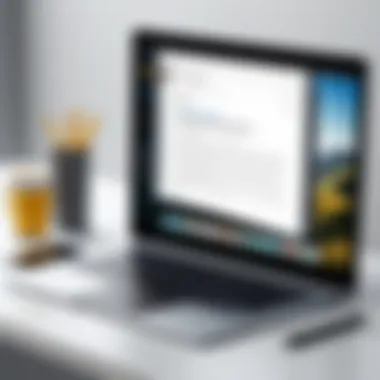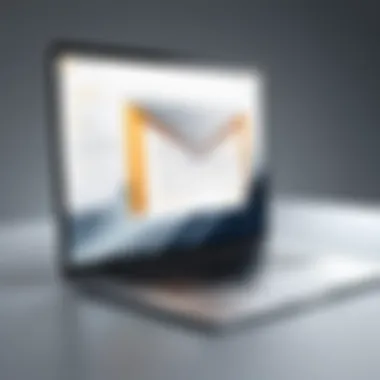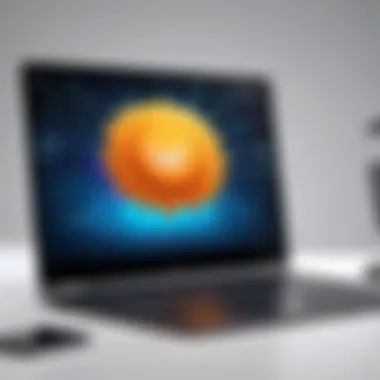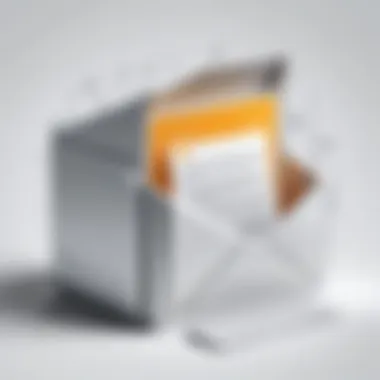Crafting a Thank You Email: Key Subject Line Tips


Intro
The subject line of a thank you email is often overlooked, but it serves as the crucial first impression your correspondence will make. In the competitive field of job hunting, even minor details can significantly influence perception. Crafting an effective subject line is not merely a formality; it is a strategic component of professional communication that reinforces your significance and helps you stand out.
Job candidates often focus on the email's body, but the subject line is the gateway. A well-crafted subject line can entice the recipient to open your email promptly. Its importance extends beyond mere visibility; a direct and relevant subject enhances clarity, which is paramount in professional correspondence.
This article will explore best practices for creating a compelling subject line in your thank you email after an interview. By understanding what makes a subject line stand out, you can ensure that your thoughtful message receives the attention it deserves.
Key Considerations
- Conciseness: Keep the subject as brief as possible while capturing the essence of your message.
- Relevancy: Clearly reference the position or interview to establish context immediately.
- Professional Tone: Maintain a respectful and formal tone to align with the expectations in professional communication.
By the end of this discussion, readers will not only understand factors leading to an optimal subject line but also recognize the overall impact of a purposeful thank you email in advancing their candidacy.
Foreword
In today’s competitive job market, sending a thank you email after an interview is essential. The thank you email serves not only as an expression of appreciation but also as an opportunity to reinforce your candidacy. A well-crafted subject line is a crucial first step in ensuring your message gets the attention it deserves.
A strategic and thoughtful subject line can significantly enhance the likelihood that your email is opened and read promptly. In an inbox filled with countless messages, your email should rise above the queue. This article aims to explore the varying elements involved in creating the ideal subject line, considering not just creativity but professionalism and clarity as well.
Moreover, the subject line sets the tone for your entire email. If it is engaging yet concise, it may motivate the recipient to continue reading. A subject that reflects gratitude while connecting to the specific interview fosters an impression of attentiveness. By understanding the best practices for creating effective subject lines, readers can equip themselves with the tools to leave a positive and lasting impression post-interview.
Thus, in this section, we will dissect the importance of each component of the thank you email and entwine it particularly with the opening subject line – all with the aim to bolster chances of landing that coveted job offer.
Understanding the Importance of a Thank You Email
Writing a thank you email after a job interview holds greater significance than oftentimes recognized. It offers candidates an opportunity to reinforce their candidacy while contributing to the cultivation of a professional rapport. The simple act of expressing gratitude not only showcases your personality but fosters a sense of appreciation.
Why Send a Thank You Email?
Athank you email serves several useful purposes. First, it expresses appreciation for the interview opportunity. This shows that you value the time and effort the interviewers dedicated to meeting you. A sincere thank you does not go unnoticed; it helps to distinguish you from other candidates.
Second, it gives you insight into the position while allowing for a follow-up on any discussions you had. Communicating your continued interest reiterates your dedication to the role.
Lastly, it helps to reinforce a positive impression. With so many candidates vying for attention, thoughtful emails set you apart. It continues the conversation initiated during the interview.
The Role of Professional Etiquette
Professional etiquette within a workplace context includes many facets. A thank you email strengthens this definition through appropriate communication. Industry standards often dictate that candidates should aim to follow up with thoughtful communications. This demonstrates respect and consideration created during an interview.
Sending a thank you note communicates maturity and awareness of professional norms. Understanding when to fan out and build relations is equally important. A well-composed email reflects positively on you, potentially influencing the decision-making team.
In summary, taking the time to send a carefully crafted thank you email following an interview can greatly enhance your positioning. Mindfully considering this aspect of professional interactions adds to a much wider context of successful landing the role.
Elements of a Thank You Email
Crafting an effective thank you email post-interview is critical in ensuring your candidacy remains relevant in the hiring process. This email acts as both a professional courtesy and a final touchpoint to demonstrate your suitability for the role. Within this framework, specific elements of the thank you email can make a significant impact. Understanding each component’s importance contributes to an engaging presentation of both gratitude and professionalism.


Personalization
Personalization in your thank you email is essential. It offers the chance to connect your message with the specific individuals involved in the interview. A generic email demonstrates a lack of attention which can make a negative impression. Instead, mention details such as the interviewer’s name and the topics discussed. This demonstrated interest reflects positively on your character and thoughtfulness.
A tailored approach can highlight shared interests or insights exchanged during the interview. If you mentioned a specific project from your work history that relates to the company's goals, briefly reintegrating that context fosters connection.
For example, if Sarah Smith, the hiring manager, appreciated your experience with a particular software, note that in your email:
“Thank you for discussing the opportunities for innovating through software solutions at [Company Name].”
Such an inclusion not only enhances connection but clarifies that you were engaged during your conversation.
Gratitude Expression
Expressing gratitude is the core of a thank you email. This reinforces that you value the opportunity. It isn't enough to simply thank the interviewers for their time; specificity strengthens appreciation. Acknowledging the effort that interviewers put into evaluating applicants shows respect for their role.
Consider highlighting how specific aspects of the interview or their insights briefly impacted your outlook on the company or role. You may write:
“I truly appreciated learning about [Study or Project Name] in our conversation, which gives me a better understanding of [Company Name] values.”
This way, not only do you convey thanks, but you also emphasize concrete topics from the interview.
Reiteration of Interest
Reiterating your interest in the position solidifies your candidacy strength. It serves as an opportunity to reaffirm your enthusiasm and alignment with the organization's vision. This inclusion ensures interviewers remember your stance and can help to envision you stepping into that role.
Be clear in stating why you feel a genuine connection to the position. A direct acknowledgment might be:
“After our conversation, I am even more enthusiastic about the possibility of contributing to [Company Name] as [Position Name].”
This type of statement not only emphasizes excitement but provides a reason or motivation underpinning interest.
Closing Remarks
The concluding remarks in a thank you email should summarize your gratitude and eagerness in a succinct form. It is a key place to reinforce the next steps. Although this may seem simple, a concise and effective closing will assure the interviewer of your professionalism.
Closing confirmations such as offering to provide additional information or simply wanting to keep the line open can exhibit continued engagement. A possible line may read:
“Please let me know if you need any additional information from my end.”
This type of closing maintains clarity and open communication and encourages continued interaction, crucial elements in a constructive hiring process.
In summary, when combined, these elements have the power to influence hiring decisions profoundly. Each section should ethealesce into a memorable closing wave of professionalism. This affects the interviewer while allowing your personality to shine through.
“Attention to detail is a vital facet that transforms a simple message into an impactful one.”
Crafting the Subject Line
Crafting a subject line for your thank you email is not merely a formality; it plays a pivotal role in the overall impression you leave with a hiring manager. It is the first thing the recipient sees when your email lands in their inbox. A well-crafted subject line can spark interest, highlight professionalism, and set the tone for the rest of your message. Given that many hiring managers tend to oversee multiple candidates, a striking subject line can ensure your email does not get lost in the shuffle. This section will analyze the significance of formulating a fitting subject line, alongside practical guidelines and productive examples.
Why the Subject Line Matters
The subject line serves various functions within the thank you email. Firstly, it establishes context. A generic subject line such as “Thank you” can easily be overlooked among other messages that exhibit more specificity. Sometimes, it is crucial to echo the interview format or reference a particular aspect of the conversation that stood out.
Moreover, the subject line creates the initial impression. Hiring managers appreciate clarity. If your subject line is clear and to-the-point, it raises the probability that they will delve into the body of your message. An engaging subject line is key to gaining the reader's attention and can lead to your email being read promptly.
Best Practices for Subject Lines
Here are key practices to consider while crafting your subject line:
- Be Specific: Use the job title or a relevant descriptor. For instance, “Thank You for the Digital Marketing Associate Interview” aligns precisely with the conversation you had.
- Keep It Concise: Lengthy subject lines may get cut off in email previews. Aim for clarity in just a few words while retaining the necessary detail.
- Avoid Generic Language: Subject lines like “Thanks!” do not convey enough context. Opt for more descriptive phrases that articulate your purpose.
- Encourage a Response: A subject line that opens a dialogue can pique interest. For example, “Reflecting on our conversation about [specific project]” not only shows engagement but invites continued dialogue.
Examples of Effective Subject Lines
Examining sample subject lines can illustrate effective techniques:


- “Thank You—Following Up on the Software Engineer Interview”: Clarifies context and indicates what the email pertains to.
- “Appreciating Our Conversation Regarding [Specific Topic]”: Establishes reference to a key talking point in the interview conversation, increasing personal connection.
- “Thank You for the Opportunity – Excited About the Next Steps”: Combines gratitude with eagerness, effectively signaling your aspirations.
Choose a subject line that mirrors the true essence of your interview. It is a reflection of your understanding and engagement in the conversation.
Aligning the subject line’s tone and specificity with the context of your interview dialogues increases the likelihood that your thank you email is impactful and well-received. By adhering to best practices in subject line construction, one can capitalize on this small yet significant element in the thank you email process.
Common Mistakes in Thank You Emails
When sending a thank you email after an interview, it's crucial to be aware of several common mistakes that can undermine your efforts. The subject line serves as the gateway to your message, but the content of your email must also be accurate and appropriate. Making errors can reflect poorly on your professionalism and, in some instances, could jeopardize your chances of securing the position. Here, we will explore these missteps: overly casual language, generic messages, and neglecting follow-up.
Overly Casual Language
Using a too casual tone in a thank you email can create a disconnect. Interviews are professional exchanges, and maintaining a level of professionalism in your communication is necessary. Words like "Hey" or colloquialisms like "Thanks a bunch" may diminish the gravitas of your message. Employers want to see that you can adapt your communication style to fit a professional context.
Instead, opt for a respectful greeting, such as "Dear [Interviewer's Name]". In the main body, reflect sincerity and graciousness. It is also important to consider using complete sentences and avoiding slang. Your tone should express genuine gratitude but remain respectful and concise.
Generic Messages
One of the easiest pitfalls to fall into is sending a generic thank you note. When you use a template or copy a message from someone else, it shows a lack of effort or interest in the specific position and organization. A generic email can make the recipient feel unappreciated, as if you did not invest any thought into their time.
Instead, personalize your message by referring to specific topics mentioned during your interview. Perhaps you connected over a shared interest in an industry trend or a project the company is undertaking. These references communicate that you were engaged and present during the interview. They help assemble a strong case for your candidacy.
Neglecting Follow-Up
Finally, forgetting to follow up after sending the thank you email may communicate ungraciousness. While an interview might feel like a culmination, it is only part of the journey. If you said you would send additional information, do not come short. Send all intended materials promptly.
Following up can reinforce your enthusiasm for the角色 and demonstrate commitment. You could also leverage the follow-up opportunity to add tidbits forgotten during the interview. Avoiding neglect in this area is essential in laying smooth rapport with potential employers.
The aim of a thank you email is not just courtesy; it is to improve your candidacy by cultivating a stronger connection.
By avoiding these common mistakes—duly noting the importance of tone, personalization, and follow-up—you can maximize the impact of your thank you email after an interview.
Timing of Your Thank You Email
The timing of sending a thank you email can greatly impact the effectiveness of this essential follow-up communication. Promptness communicates to the employer that you value the opportunity and maintain professionalism. Distinguishing the best time to send your email involves considering both the day and hour, ensuring your message aligns with typical business practices and respects the recipients' schedules.
When to Send the Email
Sending your thank you email promptly is crucial. Ideally, this should occur within 24 hours post-interview. This window allows you to express appreciation while the interview is still fresh in the interviewer's mind. If possible, submit the email the same day as the interview. This quick response shows enthusiasm and dedication.
If delays are unavoidable, and you miss the 24-hour window, ensure it is sent no later than two days after. On second thought, sending too close to a busy time, such as end of the workweek, might risk your email being overlooked. Consider sending it on a Tuesday or Wednesday for better visibility.
Understanding Response Timeframes
Keep in mind typical response timeframes after job interviews. Hiring processes vary significantly among companies. Some prioritize swifter decision-making, while others may take weeks. Be prepared for these variations. Meanwhile, recognizing response signs cal explains much to candidates. For instance, if you have not heard back within a week, politely following up with a brief message can serve as a reminder of your interest.
Moreover, understand the context of the organization. Big companies might have a slower turnaround due to structured decision processes, whereas start-ups could have faster responses.


As per career experts, reaching out too soon or too late can damage the impression you wish to leave when you're fresh in their minds.
Overall, strategic timing communicates not just your gratitude but your understanding of professional norms. Combine a timely approach with other aspects of your thank-you email for best results.
Case Studies: Analyzing Thank You Emails
Analyzing case studies related to thank you emails sheds light on practical implementations of the advice and theories discussed. This section aims to provide real-world examples that illustrate the success or failure of different email approaches. Understanding these examples can uncover the subtle nuances that determine effectiveness. Furthermore, learning from these case studies offers readers the chance to refine their techniques and avoid common pitfalls.
Successful Thank You Emails
Successful thank you emails retain certain characteristics that often lead to positive impressions on potential employers. Here are key elements seen in effective samples:
- Clear Subject Line: A strategic subject line often captures the recipient's attention immediately. For example, a subject like "Thank You for the Opportunity – [Your Name]" is direct and appropriate.
- Personalization: Mentioning specific points from the interview, such as a project discussed or values shared, can resonate with the reader. Takeaways from the interaction make the email memorable.
- Confirmation of Interest: A quality thank you email will reassert the candidate’s enthusiasm for the position, reinforcing their interest. Phrasing such as "I am very excited about the possibility of joining your team" can establish clear intent.
- Concise and Grateful Language: Expressions of gratitude need to be straightforward without excessive embellishments. An effective note often just states, "I appreciate your time and guidance during the interview process."
A successful email from a customer care representatives position
How important the follow-up is: "A well-crafted thank-you letter can set you apart in the eyes of potential employers."
Less Effective Examples
In contrast, less effective thank you emails tend to fall into common traps that detract from their positive potential. Observations drawn from these emails highlight critical errors and missed opportunities.
- Generic Language: An email that relies on boilerplate phrases may fail to make a connection. Saying things like "Thank you for your time" without context misses the chance to personalize.
- Overly Formal Tone: An attempt to sound professional can backfire when the tone becomes robotic. A cold farewell like, "Best Regards" without warmth risks leaving a negative impression.
- Ignoring Key Points: Failing to reference subjects addressed in the interview can create a perception of disinterest. Notatically mentioning specifics might render the email ineffective in memory retention.
- Grammar and Typos: Excellence in professionalism is expected, thus an email riddled with errors can signal carelessness.
A critical follow-up
Analyzing these varied examples provides without ambiguity how slight modifications can lead to notable differences in perception and effectiveness. Readers can extract actionable insights from these case studies, using both exemplary and poor emails as safe lessons for crafting their communication.
For additional exploration on the topic of effective communication, consider checking more methods of professional messaging about values found on Wikipedia or feedback formats on Reddit to get broader perspectives.
Final Thoughts
Several key elements stand out when reflecting on the overall process. Firstly, a personalized touch makes the recipient feel acknowledged. This can enhance their perception of you as a considerate and detail-oriented candidate. Secondly, the tone of your message reflects your professional demeanor. Striking a balance between formality and approachability in your language invites a suitable response without straying from professionalism.
Additionally, consider the broader implications of your thank you email. It demonstrates not just your gratitude but also your enthusiasm for the role. Staying at the forefront of the hiring manager's mind can be advantageous, especially in a competitive job market. Different roles may dictate varying nuances in email etiquette, making it essential to tailor your approach based on the interview experience you had.
It is beneficial to set aside some time for reflection after the interview. This ensures that your email is both thoughtful and responsive to the specific dialogue shared.
Ultimately, every part of your thank you email, starting from the subject line to the closing remarks, plays a role in establishing your candidacy. As a reflection of your eagerness and professionalism, the task of crafting a well-architecture email warrants thoughtful consideration. The positive impression it can leave is an investment worth making in your professional journey.
References and Further Reading
The significance of referencing and further reading cannot be overstated, especially in the context of crafting a thank you email after a job interview. The topics discussed in this article underscore key strategies and considerations when writing in a professional setting. To provide additional resources enriches the ideas presented and allows for a deeper understanding.
Importance of References
References guide readers toward a more thorough grasp of the themes discussed. Knowledge enhances comprehension of subject line dynamics, etiquette nuances, and common pitfalls in the thank you emailing process. When readers consult reliable references, they can explore successful case studies, academic frameworks, and recent trends in professional communication.
Benefits of Further Reading
Additional reading prospectus broadens the knowledge base. Here are several benefits:
- Deeper Insights: Delving into conference papers, workshops, or reputable articles about professional correspondence can provide nuanced understanding on email crafting.
- Up-to-date Trends: Digital communication evolves frequently. Following recent publications ensures that the practices stay relevant with others in the industry.
- Broader Perspective: Expanding reading materials exposes new ideas and alternative practices, which can improve one's own email craft.
Considerations about References and Further Reading:
It is important to select meaningful resources. Look for academic papers, industry publications, or professional blogs known for their expertise. Ensure that the resources are credible and recent, because the relevancy can impact decision-making.
Referencing helps ensure a high standard in professional emails. Take the time to review. Solid references allow for full mastery of practices aimed at impressing the reader.
“Clarity and professionalism distinguish exceptional correspondence from average emails.”



